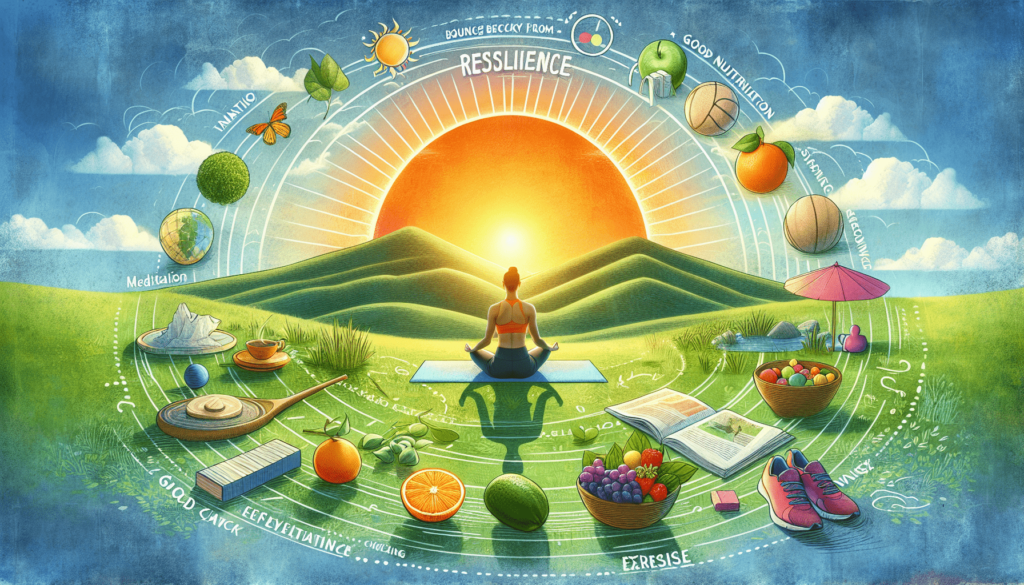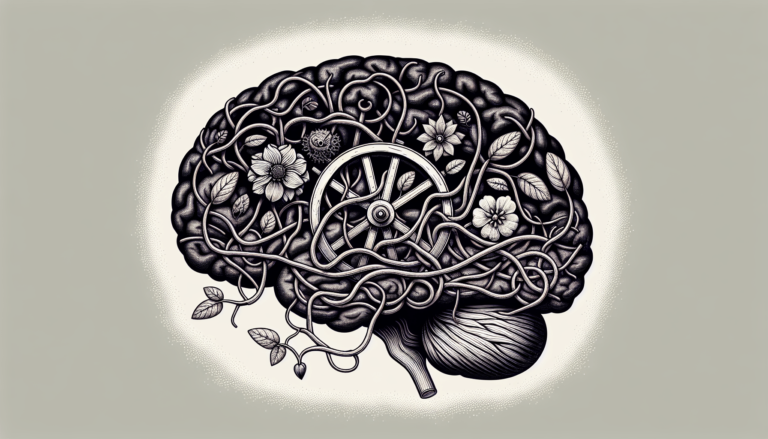The Importance Of Self-Care In Building Resilience
In today’s fast-paced world, it’s easy to get caught up in the chaos, constantly juggling work, relationships, and responsibilities. However, amidst this hustle and bustle, it’s crucial to prioritize self-care in order to build resilience. Taking the time to nurture your physical, mental, and emotional well-being not only helps you to be more resilient in the face of challenges, but also enhances your overall happiness and sense of fulfillment. By making self-care a priority, you are investing in your own ability to bounce back from adversity and lead a more balanced and fulfilling life.

What is self-care?
Self-care is a term that has gained significant attention in recent times, but what exactly does it mean? At its core, self-care refers to the intentional and deliberate actions we take to prioritize our own well-being, both physically and mentally. It involves recognizing our own needs and taking the necessary steps to meet those needs, in order to maintain a healthy and balanced life.
Definition
Self-care can be seen as a multifaceted concept, encompassing various aspects of our lives. It involves taking care of our physical health, nurturing our emotional well-being, prioritizing our mental wellness, fostering healthy social connections, and engaging in activities that align with our spiritual and personal values. In essence, self-care is about making choices and taking actions that promote our overall well-being and resilience.
Types of self-care
Self-care can take on many forms, and it is important to identify which types of self-care resonate most with you. Some common types of self-care include physical self-care, emotional self-care, mental self-care, social self-care, and spiritual self-care. Each of these types addresses different aspects of our lives, and together they form a comprehensive approach to self-care.
The concept of resilience
Resilience is a term that is often associated with the ability to bounce back from adversity. It is the capacity to adapt and navigate through life’s challenges with strength and grace. While some individuals naturally possess resilience, it is also a skill that can be developed and nurtured over time.
Definition
Resilience can be defined as the ability to maintain a sense of well-being and function effectively in the face of stress, adversity, or change. It involves having a flexible mindset, strong problem-solving skills, and the capacity to regulate our emotions. Resilience allows us to bounce back from setbacks, learn from difficult experiences, and continue moving forward in life.
Factors that contribute to resilience
Resilience is not solely determined by personal traits or characteristics. It is influenced by a combination of internal and external factors. Internal factors include our ability to regulate our emotions, our level of optimism, our problem-solving skills, and our self-esteem. External factors can include our social support systems, the quality of our relationships, our access to resources, and the overall environment in which we live.
The relationship between self-care and resilience
Self-care and resilience are closely intertwined, with one supporting and enhancing the other. Engaging in regular self-care practices can significantly contribute to the development and strengthening of our resilience.
How self-care enhances resilience
Self-care is a vital component of resilience because it allows us to recharge and refuel our physical, mental, and emotional resources. Engaging in activities that promote self-care helps us maintain a sense of balance and well-being, which in turn enables us to better navigate and cope with life’s challenges. By taking care of ourselves, we build the foundation necessary to bounce back from adversity and handle stress in a healthier manner.
The role of self-care in preventing burnout
Burnout is a common phenomenon experienced by many individuals, especially those who neglect self-care. Burnout can manifest as physical and emotional exhaustion, a decrease in motivation and productivity, and a sense of cynicism or detachment. Self-care acts as a preventive measure against burnout by ensuring that our needs are met and that we have mechanisms in place to manage and reduce stress levels. Without self-care, we are at a higher risk of experiencing burnout and its detrimental effects on our overall well-being.
Physical self-care
Physical self-care involves taking care of your body and engaging in activities that promote physical well-being.
Importance of exercise
Regular exercise is crucial for maintaining physical health and overall well-being. Engaging in physical activity increases endorphin levels, reduces stress hormones, and improves sleep quality. Whether it’s going for a run, practicing yoga, or playing a sport, finding activities that you enjoy and incorporating them into your routine can have a significant impact on your physical and mental health.
Maintaining a healthy diet
Eating a balanced and nutritious diet is essential for fueling your body and providing it with the necessary nutrients. A diet rich in fruits, vegetables, whole grains, and lean proteins can boost your immune system, improve your energy levels, and support overall well-being. Avoiding excessive consumption of processed foods, sugary snacks, and alcohol can also contribute to better physical health.
Getting enough sleep
Sleep plays a crucial role in our physical and mental well-being. It is during sleep that our bodies repair and regenerate, and our brains consolidate information and process emotions. Prioritizing a consistent sleep schedule, creating a relaxing bedtime routine, and establishing a comfortable sleep environment can all contribute to better sleep quality and overall physical well-being.

Emotional self-care
Emotional self-care involves recognizing, acknowledging, and nurturing your emotions, as well as engaging in activities that bring you joy and contentment.
Recognizing and expressing emotions
Emotional self-care begins with developing emotional awareness. Take the time to truly understand and acknowledge your emotions without judgment. Practice self-reflection and journaling to explore your feelings and identify any patterns or triggers that may be present. Expressing your emotions through healthy outlets such as talking to a trusted friend or seeking professional therapy can be invaluable in maintaining emotional well-being.
Engaging in hobbies and activities that bring joy
Engaging in activities that bring you joy and satisfaction is an important aspect of emotional self-care. It can be anything that ignites your passion and allows you to immerse yourself in the present moment. This could include painting, playing an instrument, cooking, gardening, or simply spending time in nature. These activities provide a sense of fulfillment and help rejuvenate your emotional well-being.
Practicing self-compassion
Self-compassion involves treating yourself with kindness, understanding, and patience. It is about recognizing that it’s okay to make mistakes and not being too hard on yourself when things don’t go as planned. Practice self-compassion by offering yourself words of encouragement, embracing self-care activities without guilt, and cultivating a positive mindset towards yourself and your emotions.
Mental self-care
Mental self-care focuses on nurturing and protecting your mental well-being through various strategies and practices.
Setting boundaries and saying no
Setting clear boundaries is essential for maintaining good mental health and avoiding burnout. Learn to say no when necessary in order to protect your time, energy, and mental well-being. Setting boundaries allows you to prioritize your own needs, protect yourself from unnecessary stress, and maintain balance in your life.
Engaging in relaxation techniques
Relaxation techniques such as deep breathing, progressive muscle relaxation, and meditation can help calm the mind and reduce stress levels. These techniques promote relaxation and mindfulness, allowing you to cultivate a sense of peace and calm amidst the chaos of daily life. Find relaxation techniques that resonate with you and incorporate them into your daily routine.
Practicing mindfulness and meditation
Mindfulness and meditation are powerful practices that can enhance mental well-being. They involve bringing awareness to the present moment and nonjudgmentally observing your thoughts and emotions. Regular mindfulness and meditation practice can reduce anxiety, improve focus and concentration, and cultivate a sense of inner peace and clarity.
Social self-care
Social self-care involves nurturing and maintaining healthy relationships, seeking support from others, and creating a support network.
Building healthy relationships
Good relationships are crucial for our emotional well-being and resilience. Nurture and invest in relationships that bring positivity, support, and encouragement into your life. Surround yourself with people who uplift you, challenge you, and genuinely care about your well-being. Building and maintaining healthy relationships plays a vital role in fostering a strong support system.
Seeking support from others
It’s important to recognize that we don’t have to face life’s challenges alone. Seeking support from others can provide comfort, guidance, and a fresh perspective. Whether it’s talking to a friend, family member, or seeking professional therapy, reaching out and allowing others to support you can make a significant difference in your resilience and overall well-being.
Creating a support network
Creating a support network involves actively cultivating relationships with individuals who have your best interests at heart. This can include joining social groups or communities with shared interests, participating in support groups or therapy sessions, or engaging in online communities focused on personal growth and well-being. Having a support network provides a sense of belonging, connection, and reassurance during difficult times.
Spiritual self-care
Spiritual self-care focuses on exploring and nurturing your personal beliefs, values, and sense of purpose in life.
Engaging in activities that align with personal values and beliefs
Identify what is important and meaningful to you and engage in activities that align with those values and beliefs. This might involve spending time in nature, practicing gratitude, engaging in acts of kindness, or finding solace in prayer or meditation. Connecting with your spirituality and investing time and energy in activities that resonate with your personal values can provide a sense of purpose and fulfillment.
Finding meaning and purpose in life
Finding meaning and purpose in life involves exploring your passions, interests, and what brings you joy. Identify your strengths and talents and find ways to incorporate them into your daily life. Engaging in activities that give your life meaning can provide a sense of fulfillment and increase your resilience when facing challenges.
Practicing gratitude and mindfulness
Expressing gratitude and practicing mindfulness are important components of spiritual self-care. Cultivating gratitude involves recognizing and appreciating the blessings and positive aspects of your life. Mindfulness, on the other hand, involves bringing awareness to the present moment and embracing it without judgment. By practicing gratitude and mindfulness, you can develop a deeper connection with yourself, others, and the world around you.
The challenges of practicing self-care
While self-care is important, it is not always easy to prioritize or consistently implement in our lives. There are several challenges that can hinder our self-care efforts.
Societal pressures and expectations
Societal pressures and expectations can make it difficult to prioritize self-care. We often feel the need to constantly be productive, achieve certain goals, and meet societal standards of success. This can result in neglecting our own well-being in favor of meeting external expectations. Overcoming these societal pressures and giving ourselves permission to prioritize self-care is key.
Guilt and self-judgment
Guilt and self-judgment can also hinder our ability to practice self-care. We may feel guilty for taking time for ourselves, perceiving it as selfish or unproductive. It is crucial to recognize that self-care is necessary for our overall well-being and resilience, and that taking care of ourselves is not a selfish act, but rather a selfless one. Overcoming guilt and self-judgment is essential in order to prioritize and embrace self-care.
Time management
Time management is often cited as a barrier to practicing self-care. We live in a fast-paced world where time seems to slip away quickly. However, it is important to recognize that self-care does not always require large chunks of time. Even small, intentional acts of self-care can make a significant difference. Learning to manage our time effectively and prioritize self-care can help overcome this challenge.
Tips for implementing self-care practices
Implementing self-care practices may initially seem challenging, but with intentional effort and dedication, it can become a natural and integral part of your life.
Identify your needs and prioritize self-care
Begin by identifying your own needs, both physically and mentally. Take the time to reflect on what energizes you, what brings you joy, and what helps you recharge. Once you have identified your needs, make a commitment to prioritize self-care in your daily life. Understand that self-care is essential for your well-being and resilience, and make it a non-negotiable part of your routine.
Create a self-care routine
Establishing a self-care routine can help ensure that you consistently prioritize your own well-being. Create a schedule or set specific times in your day or week for self-care activities. This could be anything from going for a walk, reading a book, practicing mindfulness, or engaging in a hobby. Having a routine helps create structure and accountability, making self-care a regular part of your life.
Seek professional help if needed
If you find it challenging to practice self-care or are struggling with maintaining your well-being, seeking professional help can be beneficial. A therapist, counselor, or life coach can provide guidance, support, and strategies to help you overcome any obstacles you may be facing. Remember, reaching out for help is a sign of strength, not weakness, and can be a crucial step in building resilience and maintaining your overall well-being.
In conclusion, self-care plays a vital role in building resilience and nurturing our overall well-being. By prioritizing self-care in each of its varied forms – physical, emotional, mental, social, and spiritual – we can enhance our ability to bounce back from adversity and navigate life’s challenges with strength and grace. It is important to recognize that self-care is not a luxury, but a necessity, and that by taking care of ourselves, we are better equipped to care for others and lead fulfilling, resilient lives. So, embrace the power of self-care and watch as it transforms your life for the better.







